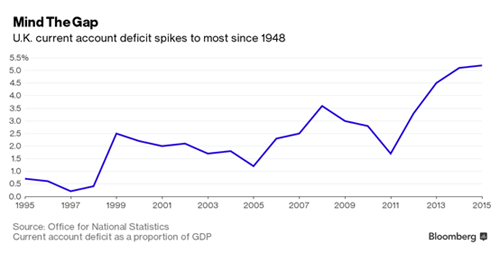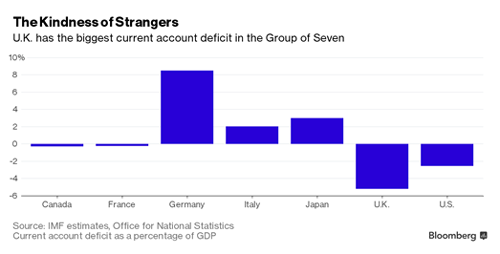Is Brexit-induced volatility blowing out the UK current account deficit and causing the pound to slide against the US dollar and the euro? That question rears its thorny head this week with two pieces of macroeconomic data. Let’s do the data first, then the analysis.
First up is UK GDP data from the fourth quarter. Fourth quarter growth was revised up from 0.5% to 0.6%. Annualised growth was revised up from 1.9% to 2.1%. And for all of 2015, GDP growth came in at 2.3% (up from an expected 2.12%). By comparison GDP grew at 2.8% in 2014.
There’s not much in those figures we don’t already know. The British economy is growing faster than economies on the Continent. But the growth is tepid, below expectations, and blowing out all sorts of holes in Chancellor George Osborne’s revenue estimates (larger deficits, bigger debt).
And speaking of deficits, let’s discuss the second piece of data. The British economy posted the largest current account deficit since record keeping began. The fourth quarter current account deficit was £32.7 billion, or 7% of GDP. For the entire year, the current account deficit came in at £92.6 billion, or 5.2% of GDP. That was the largest annual current account deficit as a percentage of GDP since the good old days of 1948.
The two deficits
You might be wondering how the UK’s “second deficit” (the other one being the government budget deficit) can get larger even as the economy grows. Well, the two forces are not unrelated. Consumer spending drives the growth in GDP. People reduce savings, or borrow money, and buy imports. Meanwhile, exports decline and the trade deficit rises.
But remember, the current account deficit isn’t just about trade. True, that’s the largest component of it. But it also includes what the Office for National Statistics (ONS) calls the primary income deficit or surplus. That number is the difference between what British investors earn on their investments abroad and what foreign investors earn from their investments in the UK.
Foreigners are doing quite well of their British investments, judging by the latest ONS figures. The primary income deficit was £13.1 billion in the fourth quarter. That was up from £5.8 billion in the third quarter.
It means that British investments in mining operations, oil and gas, and European stocks and bonds are underperforming foreign investments in British property. The result is a larger current account deficit. And unless Britain runs a surplus in the capital account and attracts more foreign direct investment (FDI), you get massive pressure for a much weaker British pound. Why?
Because a country that consumes more than it produces is not rated. By “not rated” I mean the currency is used as a measure of the country’s economic health. And at the moment, Britain has the largest current account deficit of all G-7 countries. See below.
It’s no sin to have a trade deficit. And it’s not a bad thing your economy is a popular destination for foreign capital. So what’s the problem? What does this whole issue have to do with the economy, your wages and your investments?
The risk of a running chronic current account deficit is that you’re no longer a productive economy. You don’t make things and sell them. You borrow money to buy things.
Your growth comes from consumption, and that consumption is financed by debt. A note of concern from the GDP data was that the real wages declined. How long can personal consumption drive GDP growth if real wages are in decline?
Last week I mentioned the great era of Atlantic trade that drove British growth. This wealth, partially secured by trade routes made safe by the Royal Navy, created a positive feedback loop. Strong economy, strong rule of law, strong world market order. Britain at the top of all of it.
Anti-democratic crony capitalism
It wouldn’t be normal if I didn’t try and put this in the context of the 23 June Brexit vote. Would British trade with the rest of the world be stronger if the UK left the EU? If the market is pricing in Brexit now with a weaker pound, isn’t that just what British exporters need and wouldn’t that reduce the trade deficit?
Charlie Morris and I have been trading ideas on those questions in the office. He’s begun his next report for The Fleet Street Letter. One of the central issues is whether Britain should protect and subsidise its steel industry.

Category: Brexit



